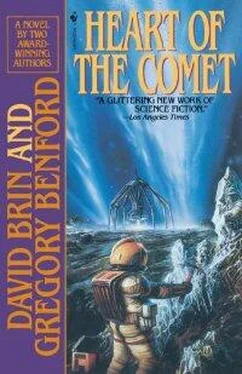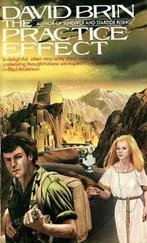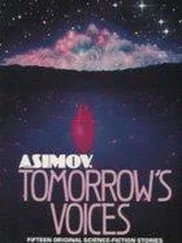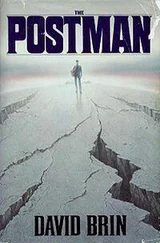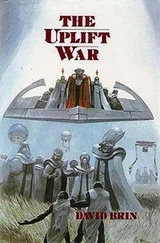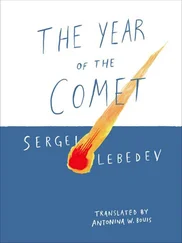“I see,” Carl told him after half an hour. “You’ve found infestations of cometary flora and fauna in every single living crew member, in every clan, even in the few people we never unslotted at all.”
Saul nodded. “Even Virginia’s bio-organic computer, JonVon, seems to be suffering from an infection. The thing’s not really alive, of course, but something’s gotten into it. I’m working to find a way to treat it.”
Carl shrugged. “I’ve tried hard to get it through the Ubers’ and Arcists’ heads that their war hardly matters, anymore. Percell, Ortho, everybody isdying.”
He started to get up. “You may have done us a service at that, Saul. Write me up a concise report for distribution. It may help us all make peace with each other, in the time we have left.’
Saul stopped him with a gesture. “Sit down, please. I’m not finished yet.”
Carl settled back into the webbing, reluctantly.
“So what else is there?”
“Remember that bioanalysis I performed on my own body?”
“Sure.” Carl nodded. “Except for your reproductive system—and that perpetual sniffle of yours—you’re fairly healthy. I’m sorry you’re sterile, Saul. And I’m glad for you that the comet bugs seem to be killing you slower than most.”
“Carl, they aren’t killing me at all.”
The other man snapped a cold look at Saul. “Don’t be an ass! Your chart showed an asymptotically increasing.”
“Increasing variety of infesting organisms, same as everybody else. By normal logic I can’t keep fighting all these infections much longer. Sooner or later one will wreck my immune system, opening me wide to all the others. Is that the pattern you’re thinking of?”
Carl nodded. “I’ve studied a lot of medical biology, over my last five duration years.”
“I guess you had to, since Svatuto quit as your doctor.”
“Right. And since Earth stopped giving advice that was worth a tinker’s damn.” Carl grimaced, remembering bitterly. “During my shifts I’ve seen guys live for years with green-tinted skins and low fevers, fighting on like champions… only to fall to pieces— literally —when that last straw hit.”
Saul shrugged. “That was them.”
“And you’re different?” Carl sneered. “You’resomehow especially blessed?”
Saul wanted to laugh. Blessed? Oh, Miriam, what has the almighty done to your simple Saul?
He paused and took a breath. “I want to tell you about something. Let me talk to you about symbiosis.”
Imagine a virus… a simple bundle of nucleic acid packaged inside a protein shell… a killer, a smart bomb with only one job—replication.
Suppose this virus finds a vector, and penetrates the skin and outer membranes of a multicelled organism… perhaps a human being At that point, its job has only begun. From there it seeks its real prey, not the man so much as a single one of his trillion cells.
Seeking might not be the proper word. For a virus is only a pseudo-lifeform. It doesn’t propel itself after vibrations or chemical traces, as protists and bacteria do. A virus only drifts, suspended in water or blood or lymph or mucus—until it strikes the surface of an unlucky cell.
Now suppose one of these little bits of half-life is lucky. It has evaded the victim organism’s defenses. No antibodies manage to latch on to it and carry it away. It isn’t engulfed and destroyed by the immune system’s strike forces. The fortunate virus survives to bump against a likely cell in just the right way, triggering adherence.
It sticks to the cell wall, a simple capsule of protein, ready to inject its contents into the prostrate prey. Once inside, the viral RNA will take over the vast, complex chemical machinery of the cell, forcing it to forge hundreds, thousands of duplicates of the original virus, until, like an overstretched balloon, the ravaged cell bursts. The new viral horde spills forth, leaving only wreckage behind.
There is the virus, stuck to the outer wall… poised to inject this tyrannical cargo into the prostrate prey…
Prostrate, yes. But helpless?
For a long time an argument raged among physicians, biologists, and philosophers. A small minority kept asking the same question over and over again.
“Why does the cell let this catastrophe happen?”
Biological heretics pointed out how difficult it was to seize and penetrate the intricate barriers of a cell wall. So much was involved, and it would seem so simple for a cell merely to refuse access.
What about the fantastic number of steps needed to turn the machinery of the cell into a slave factory, forcing the ribosomes and mitochondria to perform tasks totally alien to their normal functions?
“All the cell needs to do is interrupt any one of these steps, and the process is stopped, cold!” the unbelievers declared. “There must be a reason. Why does the cell allow itself to be such easy prey?”
Classical biologists sniffed in disgust. Animals develop new ways to fight viruses all the time, they said. But viruses evolve methods around every obstacle. The balance is always struck across a knife edge of death.
But the dissenters insisted, “Death is nothing but a side effect. Disease is not a war between species. More often, it is a case of failed negotiation.”
“You’re losing me,” Carl told Saul.
Saul drummed his fingers on the desktop and searched for the right words. “Hmmm. Let’s try an example. You know what mitochondria are, right?”
Carl inclined his head and spoke in a hollow voice. “They’re organelles… internal parts of living cells. They regulate the basic energy economy… take electro-chemical potential from burning sugars and convert it into useful forms.”
“Very good.” Saul nodded, impressed. Carl had, indeed, been studying over the long, hopeless years. No scholar, he had probably mastered the material by brute force. “And you know the widely held theory over where the mitochondria came from?”
Carl closed his eyes. “I remember reading something about that. They resemble certain types of free-living bacteria, don’t they?”
“Yes, that’s right.”
“Some people think they were once independent creatures. But long ago one of their ancestors got trapped inside one of the first eukaryotes.”
Saul nodded. “About a billon years ago… when our ancestors were only single cells, hunting around in the open sea.”
“Yeah. They think one of our ancestors ate the ancestral mitochondria. Only, for some reason it didn’t digest it that time. It let the thing stay and work for it, instead.
Carl looked up at Saul, seriously. “This is what you mean by symbiosis , isn’t it’? The early mitochondria provided more efficient energy conversion for the host cell. And in return, it never had to hunt for food again. The host cell.”
“—Our ancestor.”
“—took care of that from then on.”
“And when one divided, so did the other, passing the arrangement down to each daughter cell. The partnership was inherited, generation by generation.” Saul nodded. “The same seems true of chloroplasts, the organelles in plant cells that do the actual work of photosynthesis. They’re kin to blue-green algae. And many other cellular components show signs they may have once been independent creatures, too.”
“Yes. I do remember reading about that.” Carl seemed interested for the first time. Saul remembered some of the conversations they’d had back in the early days, before their differences had yawned like gulf between them. He wondered if Carl missed them s much as he did.
Probably more. After all, I have Virginia.
Читать дальше
